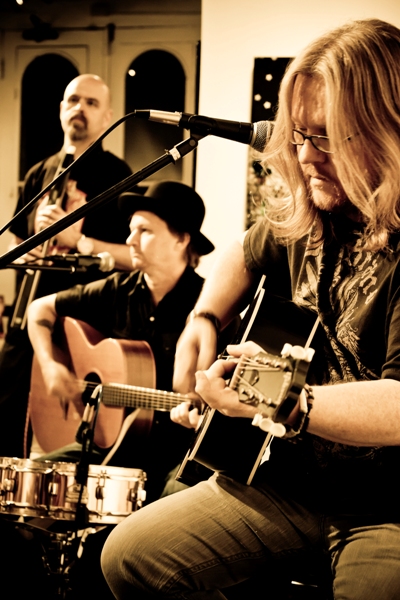
Photography by Amy Jett (amyjettfinephotography.com)
Paintings by Ron Lyon
When it comes to bands that have influenced me on a deep level, The Choir is right up at the top of the list. There is a mystique and uniqueness to this band that comes shining through in everything that they have ever released. The lineup of Steve Hindalong, Derri Daugherty, Tim Chandler, Dan Michaels and Marc Byrd is one of the most effectively artistic teams out there that still can write, record and play music that is relevant, genre defining, exceptionally peculiar yet unmistakably dazzling. These guys have always seemed to come ahead of the curve, really in a sense they defined how wide the curve could be, and they traveled it freely with numerous bands coming behind them and following their lead. You cannot talk about alternative music without listing these guys right up at the top. There might have been secular contemporaries who were in the same category, but I don’t think there was anyone in the Christian industry that was doing what these guys (and lady in the early days) were doing.
I think in most circles people cite The Choir’s 1990 release Circle Slide as their most groundbreaking record, and while that might be true to most, I think 1988’s Chase the Kangaroo was where they really started to find their sound, pick up stride and take off. The band has been in every musical nook and cranny creatively with each of the various members playing in other bands, producing and engineering for others, contributing to other projects and releasing solo material. Another milestone that I attribute to The Choir boys (Hindalong and Daugherty) was the release of At the Foot of the Cross – which was a two part release meant to inspire worship which was, again, ahead of its time.
Through it all I have not only been drawn to The Choir musically, but lyrically I think that main songwriter Steve Hindalong has been at the front of the pack with is lyrics. His writing has predominately been love songs and prayers, but there is a depth of understanding and spiritual urgency that also courses in the undercurrent of the subjects that he embraces. Hindalong has the gift of being able to really communicate the highs and lows of the human condition as it relates personally and collectively. He has the ability to convey what he has experienced in a way that encapsulates the passions and sentiments of the heart and soul. We have interviewed Steve before for a couple of different things here at Down The Line: he contributed to our Gene Eugene issue and I still have a great interview with him stashed away in the vaults for another subject at a later time.
I find Hindalong to be one of the most accommodating people that I have ever interviewed. He seems genuinely kind, interested and intent on conveying things accurately. I was grateful for the opportunity to catch up with him about their last two releases, Burning Like the Midnight Sun and de-plumed, which for Choir fans is pretty cool to get two solid albums in the same year! My thanks to Steve for being gracious and answering, re-answering, editing and re-editing the interview that took us several months. That is one of the difficult things about doing a quarterly zine, sometimes you get the news and the scoop but by the time you go to press, the present has become the past and there is newer news. Anyway, Down the Line is pleased to finally feature one of their favorite artists…enjoy!
Lyrically, have you found that Burning Like the Midnight Sun has been challenged to a greater extent by your fan base? What are your thoughts on fan reaction, etc.?
From the beginning there have been a small handful of responders to our music who seem to want everything they hear to suit their particular points of view, ideologies, agendas and so forth. After every album we would get a few scolding letters, but I stopped concerning myself about those negative reactions decades ago. My lyrics are about what I honestly feel – personal reflections of a flawed, troubled, hopeful man – crawling in and out of shadows toward the light. The responses of our listeners over the years – the ones who profess to take our songs to heart – have been overwhelmingly positive and encouraging.
This is a new era, with so much social media. Everybody has instant, easy access to you, and audience interaction is so immediate. I try to avoid polarizing debates of faith and politics; such conversations are more beneficial face-to-face between individuals with mutual respect for one another. My mind is not made up. I don’t think yours should be, either. Immensely more is hidden than is known. I believe God is alive and moving in our midst. If a song inspires listeners to ponder important things, then that’s a positive result.
What responsibility (if any) does an artist have to the listener? Obviously I know you want to appeal to your fan base, but especially in “Christian” music, is there a responsibility that bands should have to the listener in the area of faith?
That’s an interesting question, and a personal one. My initial response is: No, an artist has no inherent responsibility to his or her patrons, anymore than a patron has any obligation to an artist. They don’t have to buy it, listen to it, hang it on their wall, or pay any mind to it whatsoever. But I do appreciate artists who try to be honest – especially in matters of faith. Merchants employ tools to target certain demographics. In secular music, sex sells. In Christian music, the name of Jesus sells. The latter is more problematic, in my view. I don’t imagine most anybody walks around thinking about God and spirituality all the time. We’re consumed by the events of our daily lives. Maybe your beloved family dog just died, or you’re going through a divorce, or your child is suffering from a broken heart, or your dear friend just got diagnosed with a dreaded disease, or you’re falling in love, or you lost your job, or you just inherited a fortune… these are the sorts of things we all feel deeply about, and in my opinion, are the truest inspirations for art. I’m not saying that our spirituality is separate from the events of our lives. As believers we hope Christ is at the center of it all. But when we make music to sell in the Christian marketplace, I think it’s especially important that we examine our motives. To my ears, art, in full cooperation with commerce, so often rings less than true.
Now, having said that, I have profited from writing and producing worship songs. When I receive a royalty check in the mail I get happy like everybody else. My motivation is also impure and my heart, conflicted. But in the case of The Choir, our songs have reflected personal faith in the context of real life. We’ve offered both love songs and prayers. That’s a legacy I feel good about.
What is your favorite track on BLTMS and why?
I don’t know. I like them all right now. But if I were forced to pick just one, it would be “Bare Trees.” It’s a metaphor for the importance of transparency in intimate relationships – a beautiful marriage of words and melody. And it felt so good to offer yet another heartfelt love song to Nancy after thirty years together. And Derri sang it so well.
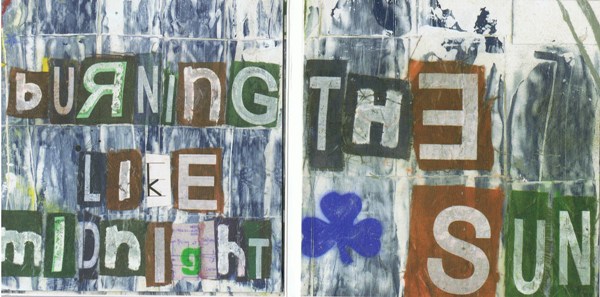
Do you write often? Or do you mostly wait until you get together to write lyrics for an album?
No, I’m not prolific at all. Most of the songs I’ve written are on albums.
Are you an avid reader? If so, who are some of your favorite authors?
Not avid, no. I read mostly for entertainment. Historical fiction is my preference. I like to feel like I’m learning something in the context of a harrowing hatchet fight. Derri and I both love Stephen Lawhead. I’ve read most of Pat Conroy’s books. A Prayer for Owen Meany by John Irving is my all time favorite. Or maybe it’s Shane, the classic cowboy novel by Jack Schaefer.
I was reading the latest review about BLTMS in The Chicago Sun Times, and it struck me again how so many critics call Circle Slide a landmark album, even overlooking the Grammy nominated Flap Your Wings. Why do you think Circle Slide is referenced so much out of your extensive catalog as a landmark album? Is it because it was so different than anything else that came out at that time?
Well, for one thing, it was our most successful album commercially. A lot more people have heard Circle Slide than Flap Your Wings… or any of our other albums for that matter.
I wouldn’t say Circle Slide was so different for the time considering the bands that influenced us. It was 1989, at the culmination of a musical storm of a decade. There were other inspirational, moody, reflective albums around that same season, like Disintegration by The Cure and Starfish by the Church. Of course, we didn’t know then that another storm was just around the corner – Nirvana and the ‘90s grunge phenomenon.
It was our sixth studio album and we had developed a strong sense of identity and creative confidence. Also, I was in the throes of a serious marriage crisis, so the lyrics are passionate and redemptive – dangerously honest, perhaps. Those themes, being universal, seem to have resonated in the hearts of listeners.
Do you find that being a Grammy nominated band brings extra pressure when creating new material?
No. We’re not sure how that nomination happened, anyway. We were actually kind of shocked. But it sure was fun to go to the Grammy’s and be a part of that whole shindig. We don’t feel much pressure to live up to anyone’s expectations beyond our own, quite honestly. I tell artists I produce to “make the record you want to hear.” Any artist who accomplishes that is successful, regardless if anyone likes it or not. That’s been our mindset for a long time. We’re pleased with our body of work, and have a lot of appreciation for each other as co-creators and players. So, it’s mostly a matter of carving out enough time to make a focused, worthy effort; we want to be satisfied with whatever music we offer. We don’t have any unrealistic commercial delusions at this point. I just feel blessed to be able to make music with my friends after all these years, so I’m grateful to any and all who will listen.
Who are some of your favorite drummers?
I appreciate innovative, energetic players whose beats serve the songs they play. A few examples are Bryan Devendorf from The National, Nathan Followill in Kings of Leon, Jason McGerr from Death Cab for Cutie, Chris Hrasky in Explosions in the Sky, Phil Selway from Radiohead, as well as more well-known drummers like Larry Mullen, Jr., Stuart Copeland, Mick Fleetwood and Charlie Watts. I also admire the great jazz legends like Elvin Jones and Buddy Rich.
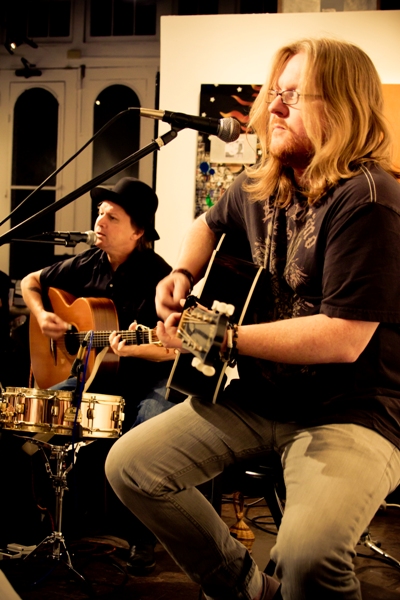 As a drummer and percussionist where do you draw inspiration for your ideas? I know there is the loop on BLTMS that you said was a crowbar hitting a nail (I think that is what it was), do you sit down and just try different sounds, or how does your percussion progress?
As a drummer and percussionist where do you draw inspiration for your ideas? I know there is the loop on BLTMS that you said was a crowbar hitting a nail (I think that is what it was), do you sit down and just try different sounds, or how does your percussion progress?
I like to find things in tool sheds and kitchens to use as percussion instruments. In the case of “A Friend So Kind,” Derri had already programmed a chillingly perfect loop. I just wanted to reinforce the backbeat with something metallic. So, I found a nail puller bar, decided to strike it with a screwdriver, and was really pleased how the note resonated in the key. I approach percussion far differently than I do when I sit down behind a drum set. The drum track is what I like to call “the vehicle the song rides in.” I either try to lay down a deep groove, or if it’s an up-tempo tune, a tight beat. I keep it simple because my kick foot has never been stellar, so why make life harder on myself? Conventional drumming is typically very objective. Like most drummers, I’ve got a kick, snare, hi-hat, cymbals and toms. I suppose most listeners visualize fairly clearly what I am hitting. Percussion, on the other hand, can be very subjective. I can open my mind and be sonically experimental. Often, listeners won’t know what I’m hitting, but I suppose sound evokes a visual response, so I imagine every person sees something different in their mind’s eye when they hear it. I enjoy contributing to the soundscape in that way.
Now indulge me this passionate proclamation: Tambourines should be wooden and round with metal pins and jingles. All plastic, misshapen ones should be promptly thrown into a heap and set ablaze. And here’s some friendly counsel to shaker players everywhere from a veteran of the skill: Hold the shaker level in cooperation with the law of gravity. Imagine yourself nipple deep in the Jordan River. Shake along the water line – evenly – as though Jesus of Nazareth has just baptized you unto perfection. And finally, all guitar players, keyboard players – and for heaven’s sake, horn players – please put down those percussive instruments and walk away slowly.
What/who would your primary influences be right now musically?
That’s hard to answer. I love the most recent albums by The National, Beach House and Grizzly Bear to mention a few. Explosions in the Sky has been sonically inspirational. But I also enjoy going back to 1971 to play Joni Mitchell’s Blue or Marvin Gaye’s What’s Goin’ On. My favorite artist of all time is Sade. Having absorbed decades of music, it’s difficult to cite any primary influences at this juncture. Derri and I listened to Wilco’s self-titled record before I played the drum track for “Between Bare Trees.” Derri has been a music-buying addict ever since I’ve known him. Every time I go over to his studio, he’s got a stack of new CDs. But we don’t mind going down memory lane, either. If we find ourselves someplace with a jukebox we always select “Feel Like Makin’ Love” by Bad Company. Haha!
Favorite Husker Du record? (Mine is Everything Falls Apart) Are you also a fan of Sugar?
Husker who? Ask Derald about that. He’s a true believer. Sugar? Yeah, I really liked their Copper Blue album from ’92.
Is everyone in the band close to each other? I know you and Derri are in Nashville, are Dan, Marc and Tim nearby as well?
Yes. Dan, Derri and I moved from southern California to Tennessee in 1993, so it’s been 17 years. Tim moved out here ten years ago, which inspired the lyric for our song, “Follow Me.” Marc also migrated to Nashville from Hot Springs, Arkansas in the mid-nineties, along with his band Common Children.
Our friendships are complex and deep. Music brought us together, but it’s about so much more than that now. We’ve shared much of life’s journey – the celebrations, the disappointments, the failures and the successes. I would throw myself in front of a train for the sake of any one of them – their wives, their children – but not their pets. Which brings me to another proclamation: Domestic animals lower the quality of our lives. My wife believes they are spiritual beings. Hmm… Animals belong in barns, or better still – in the wild. Have I deviated from your question?
What would you say the greatest challenge with the BLTMS record was?
The hardest part was getting started. After that, it was easy. Everybody likes what everyone else does, so the creative process was relatively harmonious. I felt somewhat gloomy once it was done, wishing we could compose and record more songs.
Are you guys looking for a label to get behind BLTMS, or are you okay staying independent?
Staying indie is probably our only option, so we may as well be content! Seriously, that’s what makes the most sense for us – and for most bands nowadays, it seems.
So, it had been five years between O How the Mighty Have Fallen and Burning Like the Midnight Sun. Then just a few months later in the same year you guys put out another studio album. How did the idea for de-plumed come about?
We had performed a private acoustic concert for a few faithful fans in Dan Michaels’ back yard last summer. It felt surprisingly good, so we decided to take it on the road as an acoustic duo. Our following is very devoted, so we figured most of them would already have Midnight Sun. Our initial idea was to offer a special new recording exclusively for those audiences, which would be something we could also create relatively quickly. I had recently seen one of our favorite bands, The Church, on a tour where they performed one song from each of their albums in reverse chronological order. It made for a very entertaining show. So that’s where we got the idea to reinterpret a song from each of our 12 releases, from 1985 to the present.
The title, de-plumed, was actually inspired by an art piece given to me several years ago by our gifted friend, Ron Lyon. He’s the same artist who more recently painted the front cover image for Midnight Sun. In this particular painting there is a bird and a pair of scissors. I thought, “stripped down… featherless… de-plumed.” It struck me as a great word to represent an acoustic or “unplugged” album, and also keep the whole “bird/flying” theme we’ve perpetuated for years. Plus, the artistic continuity between both albums felt poetic.
Given that you guys don’t always like to play older Choir material (from what I’ve read in previous interviews), how comfortable was it to revisit this material in such a different manner?
Honestly, it was somewhat difficult to sit there together, Derri and I listening to every album in its entirety. It’s true that I hate to look back, since I feel we’re still trying to get it right. Our current album is always our favorite and we’re already pondering what’s on the horizon. But, one afternoon, that’s what we did. We chose the songs we wanted to re-record quickly and instinctively.
What was the most challenging thing about recording an album acoustically, and what has been most rewarding?
It is definitely a production challenge to record without bass guitar, ambient electrics or keys. We used a bit of glockenspiel for counter melody. Christy Glass Byrd sang harmonies and she always sounds like a million bucks. And perhaps the best decision we made was to bring in Matt Slocum from Sixpence to play cello. He is among the most musical guys around… and a treasured friend. But my favorite song on the album might be “Love Your Mind.” And that’s simply Derri and his Gibson J-45.
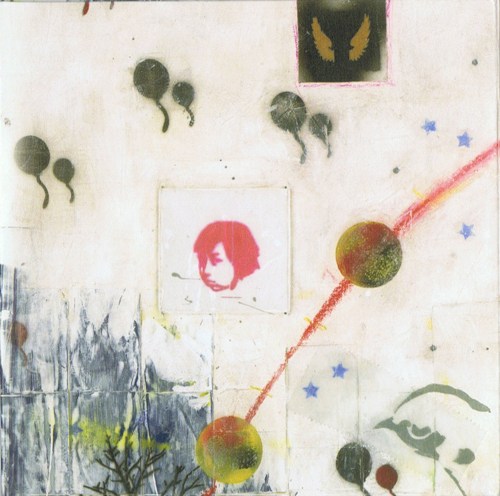 How have you and Derri enjoyed playing the shows the last few weeks?
How have you and Derri enjoyed playing the shows the last few weeks?
It’s been great to get out there and share our music this way. For the most part, we’ve played “home shows,” and we believe our songs come off well in intimate settings. Derri is singing better than ever these days, and I always enjoy getting into my bag of “percussion tricks,” playing guitar and performing a song or two of my own. It’s been satisfying to interact with people on a more personal level. The vulnerability factor is high, to be sure. Derri thinks I share too much sometimes. I don’t know. It’s my nature to be unguarded. What have we got to lose at this point, anyway? Everybody wanders in the forest. Regardless, we’ve had some fine, fun times. Folks have been truly gracious to us.
What have your favorite songs been to play live, and why?
Well, I’ve been surprised by “Clouds,” from 1987. We had never played it in concert because we weren’t confident we could pull it off as a live band. But strangely, it feels powerful as a duo. The words keep convicting me. It feels God-breathed, and I’m not one to say that about songs – almost never, really. Other than that, it’s different every night. Certain songs come alive on people’s faces. And like I said, we’ve been up close! I will say that I get a kick out of doing “Wicked Guns,” a Lost Dogs song, because I get to sing it and then twirl my rope!
Any plans to do another acoustic album?
No such plans.
How did you feel about the Undercover/Crumbacher/Lifters concert in So Cal on January 8th?
Derri and I opened the show with our acoustic set; then I played percussion for Mike Roe. In retrospect, they probably should’ve done it without us because the show was so long! Ha! The rest of the night was about nostalgia. It was fun to see The Lifters again. Chris Brigandi is a great front man, and the crowd really loved them. Crumbacher was surprisingly tight. They put on an entertaining show for sure – transporting everybody back to the mid-eighties. And I must say, Undercover was as mesmerizing as ever. Ric Alba was playing with them and I felt he added a lot – musically and spiritually.
You played with a few other people that night. What songs were the highlights for you?
Riki Michele sang “God of Wonders” with me. She’s a very dear friend, so that was special. Ojo Taylor and I also accompanied Mike Roe and Riki as they sang “Dig” in tribute to Gene Eugene. That was a soul-stirring moment.
You guys were part of a very influential music scene in Southern California in the eighties. Was it good to be together again?
It was gratifying to interact with one another after so many years – not just the folks that performed, but also several other characters from that scene who were hanging out with us. The atmosphere felt accepting and supportive. We’ve all seen plenty of valleys and hills. I celebrate each of their journeys and I wish them peace and light.
What are you working on right now?
Today, I’m writing album credits for a South African Choir project that I’ve been working on for several years. It features an awesome black choir from an impoverished township called Masiphumele. I’ve been so privileged to travel to Cape Town three times to produce the album. Several of my musician friends played on it as well as Jars of Clay, Casting Crowns and Michael W. Smith, so it’s a blend of musical cultures. I’m so excited about it! It’s called Living Hope in South Africa. It’ll be available soon.
What does the future look like for The Choir?
Derri and I will play five shows in Texas the third week of February. We’ll be touring the Midwest and then travel back east in April and May. Beyond that, I honestly don’t know. I feel like hitting some drums really hard right about now, though!
- The Choir website
- The Choir on Facebook
- The Choir Downloads website
- The Choir on MySpace
- The Choir on Twitter
- The Choir on YouTube
- The Lost Dogs website

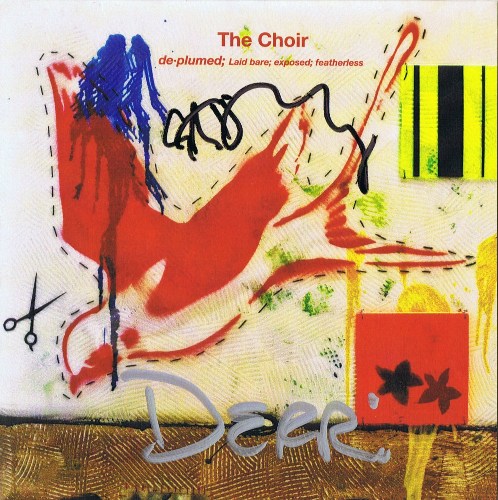

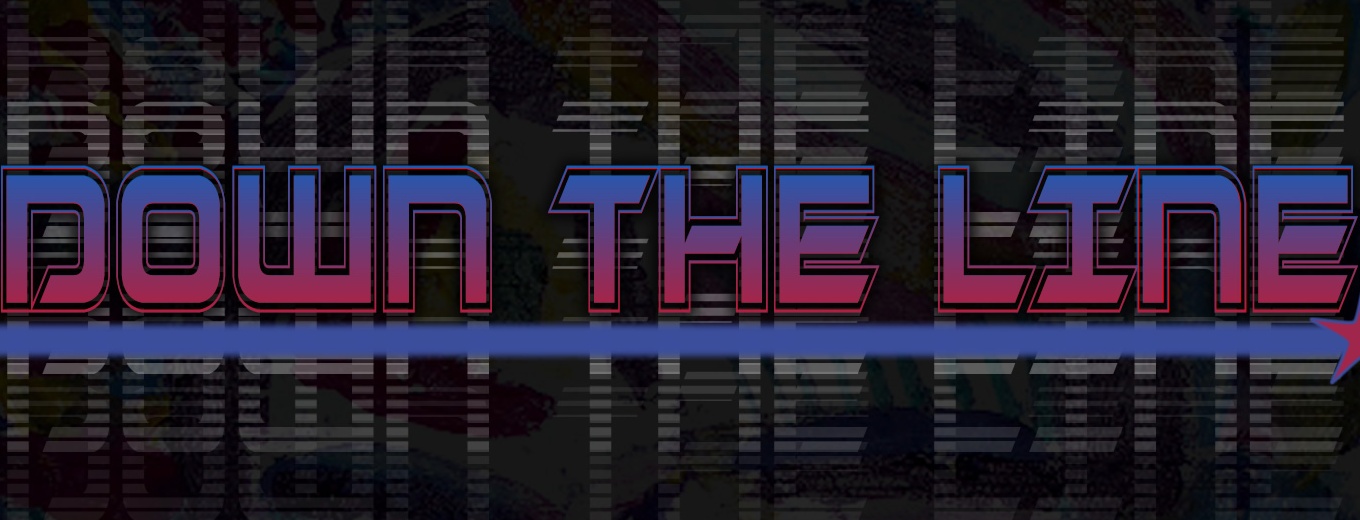
Leave a Reply